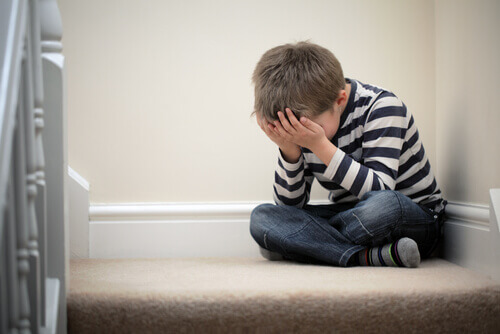Family Invalidation: when they Make you Believe you're Worth Nothing


Written and verified by the psychologist Gema Sánchez Cuevas
Family invalidation is a process which appears quite frequently. It happens in environments in which one or more people generate a type of insane dynamic that boycotts children’s self-esteem. It makes use of belittling, passive-aggressive communication, emotional manipulation and invisible abuse. This can leave a permanent imprint.
Experts in systemic family therapy say that all invalidated children run the risk of being invisible adults in the future. They are people who believe from a young age that their needs are not important. Their identities have been so diluted that they haven’t even managed to form an authentic sense of self.
“Everyone keeps a few painful wounds buried in their heart. If they can move on, it’s great. But even if they can’t, they still live. They become numb to the pain with time.”
-Kim Bok Joo-
An example of invalidation
We are dealing with an issue which is very serious and yet neglected by many parents. Here’s an example. Ana is 9 and spends the day making fun of, pinching and pushing her younger sister Carla. While Ana is restless and noisy, Carla is reserved and timid.
Carla goes to her mother in tears to ask for help. She always gets the same answer: “You’ve got to look out for yourself, mummy is busy and can’t always be looking after you”. This situation, which may seem very innocent, hides many nuances. The invalidation of the parent in this case is double, and the consequences are rather serious.
First, because the mother doesn’t take the emotions of her younger daughter into consideration. Second, because the message to this little girl is simple and direct: “I’m busy, so you’re in this on your own, sort your problems out for yourself”. An infancy marked by these kinds of invalidating dynamics can leave a deep imprint in adulthood.

From family invalidation to personal invalidation
Family invalidation is a form of emotional neglect and so it is one of the most dangerous forms of subtle neglect. Marsha Linehan, a well-known expert in mental disorders and behavioral dialectical therapy, explains in her books that these kinds of interactions generate very serious conflicts in the infant mind.
Let’s think, for example of a baby who never received attention at night each time they cried. Now imagine this same child at two, having a terrible tantrum in front of exasperated parents who don’t know how to handle them. A few years later, they tell the child off for not knowing how to tie their shoelaces. Or because they get dressed, eat or express themselves slowly… “You’re clumsy and you always cry over nothing” are the two phrases this child heard most in their first six years of life.
This whole situation crystallizes into the personality of the child in different ways. Dr. Linehan explains that family invalidation generates personal invalidation. If the emotional needs of the child were ignored from the start and they are the child who “always cries over nothing”, they will invalidate themselves. They will interpret that emotions are negative. That it is best to hide them and swallow them by force.

What happens in many cases is that the prophecy is self-fulfilling. If people tell us repeatedly as children that we won’t achieve, that this is not for us, that something is too difficult for us, that in the talent show we will play the worst part, it is likely we’ll end up internalizing this as a poisonous mantra.
However, breaking the effect of family invalidation is not only possible but also necessary. It can be survived by validating ourselves as we deserve, as others should have done at their time.
Validating ourselves as adults: the internal dialogue
Systemic and family therapies owe a lot to the human communication theory of Paul Watzlawick. Both he and other experts of the “Mental Research Institute” gave shape to an exceptional approach. This was key to the future of family therapy and a better understanding of these complex dynamics.
Within this framework he referred to the techniques of belittling. This is an empty, harmful and sometimes even aggressive kind of communication. The message to the other person contributes to invalidating them and causing upset. However, something psychologists like Dr. Linehan believe is that children who were invalidated in their infancy create an inner dialogue as adults that is based on invalidating themselves.
Self-criticism, limiting attitudes, indecisiveness, blame, constant fear and the repetitive monologue where there is no self-love contribute to perpetuating this invalidation. It’s almost like a fire in which to destroy ourselves even more…

It’s not worth it. If others formed this whole series of holes in our identify and self-esteem, let’s not inherit this dynamic. Let’s not be our own worst enemies.
Validating ourselves is possible, but to achieve this, we have to change the internal dialogue. We should speak to ourselves with respect and kindness. We should treat ourselves as worthwhile beings. As people who have a lot ahead of us, and who don’t believe in “you can’t, you don’t know, or you don’t deserve”…
It is time to be able to do it all.
Family invalidation is a process which appears quite frequently. It happens in environments in which one or more people generate a type of insane dynamic that boycotts children’s self-esteem. It makes use of belittling, passive-aggressive communication, emotional manipulation and invisible abuse. This can leave a permanent imprint.
Experts in systemic family therapy say that all invalidated children run the risk of being invisible adults in the future. They are people who believe from a young age that their needs are not important. Their identities have been so diluted that they haven’t even managed to form an authentic sense of self.
“Everyone keeps a few painful wounds buried in their heart. If they can move on, it’s great. But even if they can’t, they still live. They become numb to the pain with time.”
-Kim Bok Joo-
An example of invalidation
We are dealing with an issue which is very serious and yet neglected by many parents. Here’s an example. Ana is 9 and spends the day making fun of, pinching and pushing her younger sister Carla. While Ana is restless and noisy, Carla is reserved and timid.
Carla goes to her mother in tears to ask for help. She always gets the same answer: “You’ve got to look out for yourself, mummy is busy and can’t always be looking after you”. This situation, which may seem very innocent, hides many nuances. The invalidation of the parent in this case is double, and the consequences are rather serious.
First, because the mother doesn’t take the emotions of her younger daughter into consideration. Second, because the message to this little girl is simple and direct: “I’m busy, so you’re in this on your own, sort your problems out for yourself”. An infancy marked by these kinds of invalidating dynamics can leave a deep imprint in adulthood.

From family invalidation to personal invalidation
Family invalidation is a form of emotional neglect and so it is one of the most dangerous forms of subtle neglect. Marsha Linehan, a well-known expert in mental disorders and behavioral dialectical therapy, explains in her books that these kinds of interactions generate very serious conflicts in the infant mind.
Let’s think, for example of a baby who never received attention at night each time they cried. Now imagine this same child at two, having a terrible tantrum in front of exasperated parents who don’t know how to handle them. A few years later, they tell the child off for not knowing how to tie their shoelaces. Or because they get dressed, eat or express themselves slowly… “You’re clumsy and you always cry over nothing” are the two phrases this child heard most in their first six years of life.
This whole situation crystallizes into the personality of the child in different ways. Dr. Linehan explains that family invalidation generates personal invalidation. If the emotional needs of the child were ignored from the start and they are the child who “always cries over nothing”, they will invalidate themselves. They will interpret that emotions are negative. That it is best to hide them and swallow them by force.

What happens in many cases is that the prophecy is self-fulfilling. If people tell us repeatedly as children that we won’t achieve, that this is not for us, that something is too difficult for us, that in the talent show we will play the worst part, it is likely we’ll end up internalizing this as a poisonous mantra.
However, breaking the effect of family invalidation is not only possible but also necessary. It can be survived by validating ourselves as we deserve, as others should have done at their time.
Validating ourselves as adults: the internal dialogue
Systemic and family therapies owe a lot to the human communication theory of Paul Watzlawick. Both he and other experts of the “Mental Research Institute” gave shape to an exceptional approach. This was key to the future of family therapy and a better understanding of these complex dynamics.
Within this framework he referred to the techniques of belittling. This is an empty, harmful and sometimes even aggressive kind of communication. The message to the other person contributes to invalidating them and causing upset. However, something psychologists like Dr. Linehan believe is that children who were invalidated in their infancy create an inner dialogue as adults that is based on invalidating themselves.
Self-criticism, limiting attitudes, indecisiveness, blame, constant fear and the repetitive monologue where there is no self-love contribute to perpetuating this invalidation. It’s almost like a fire in which to destroy ourselves even more…

It’s not worth it. If others formed this whole series of holes in our identify and self-esteem, let’s not inherit this dynamic. Let’s not be our own worst enemies.
Validating ourselves is possible, but to achieve this, we have to change the internal dialogue. We should speak to ourselves with respect and kindness. We should treat ourselves as worthwhile beings. As people who have a lot ahead of us, and who don’t believe in “you can’t, you don’t know, or you don’t deserve”…
It is time to be able to do it all.
This text is provided for informational purposes only and does not replace consultation with a professional. If in doubt, consult your specialist.







